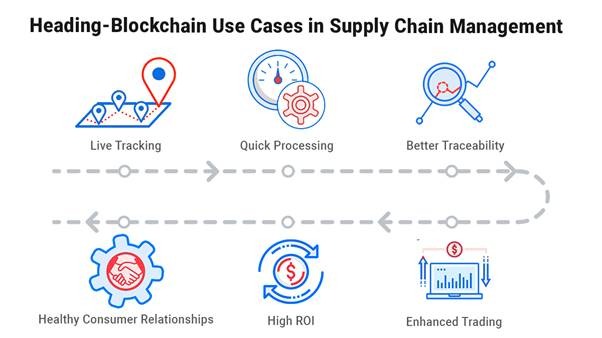In this paper, we explore the pivotal role that Blockchain technology plays in transforming supply chain management, bolstering transparency, and enhancing overall efficiency. As the backbone of digital currencies like Bitcoin, Blockchain’s unique characteristics have extended beyond cryptocurrencies, finding extensive application in supply chain domains. This paper aims to shed light on the challenges prevalent in traditional supply chain management, such as a lack of transparency, inefficiencies, counterfeit product proliferation, and disruptions, and how Blockchain can effectively address these issues.
Challenges in Supply Chain Management
Supply chain management faces a myriad of challenges that hinder its seamless operation. One of the primary concerns is the lack of transparency throughout the supply chain network. Information flow is often restricted, making it difficult for stakeholders to access real-time data and gain a comprehensive understanding of the entire supply chain process. This opacity leads to inefficiencies and delays in decision-making, potentially resulting in increased costs and decreased customer satisfaction.
Furthermore, the traditional supply chain system is riddled with inefficiencies. Cumbersome manual processes, excessive paperwork, and reliance on intermediaries create bottlenecks and delays. These inefficiencies not only add unnecessary costs but also hamper the overall agility and responsiveness of the supply chain.
Counterfeit products pose a serious threat to supply chains, impacting brand reputation and consumer safety. The lack of a foolproof mechanism to verify product authenticity allows counterfeit goods to infiltrate the market, leading to potential legal ramifications and loss of trust between businesses and consumers.
Understanding Blockchain Technology
Blockchain technology is the underlying foundation of digital currencies like Bitcoin, but its applications extend far beyond the realm of cryptocurrencies. At its core, Blockchain is a decentralized and distributed ledger system that securely records and stores transactions across multiple nodes in a network. This decentralization ensures that no single entity has control over the entire system, fostering trust and transparency among participants.
The key feature of Blockchain is its immutability, meaning that once data is recorded on the chain, it cannot be altered or deleted without consensus from the network participants. This tamper-proof nature instills confidence in the integrity of the data, making it an ideal solution for applications that demand secure and transparent records.
Blockchains can be classified into different types based on their accessibility and control. Public blockchains are open to anyone, allowing anyone to participate in the network and validate transactions. Private blockchains, on the other hand, restrict access to a select group of authorized participants, offering higher privacy levels. Consortium blockchains strike a balance, where a group of organizations collaborates to manage and validate the network.
The Role of Blockchain in Enhancing Supply Chain Transparency
Blockchain technology plays a pivotal role in enhancing supply chain transparency, addressing one of the primary challenges faced by traditional supply chain management systems. The decentralized and distributed nature of Blockchain ensures that every participant in the supply chain network has access to a shared, immutable ledger of transactions. This transparency fosters trust and accountability among stakeholders, as each party can verify the authenticity of data without relying on a central authority.
The immutability of data recorded on the Blockchain eliminates the possibility of tampering or altering historical records. Every transaction is securely linked to the previous one through cryptographic techniques, creating a chain of blocks that is nearly impossible to modify retroactively. This tamper-proof characteristic ensures the integrity of supply chain data, providing a trustworthy source of information for all participants.
Improving Supply Chain Efficiency with Blockchain
Blockchain technology offers significant potential to improve supply chain efficiency by streamlining processes and removing bottlenecks present in traditional supply chain management systems. One of the key ways in which Blockchain enhances efficiency is by reducing the reliance on intermediaries and middlemen.
In conventional supply chains, multiple parties are involved in verifying and validating transactions, leading to delays and increased costs. With Blockchain’s decentralized nature and consensus mechanisms, transactions can be verified and recorded directly between relevant parties, cutting down the need for intermediaries and expediting the process.
Moreover, Blockchain’s automated smart contracts play a crucial role in improving supply chain efficiency. These self-executing contracts automatically trigger predefined actions once certain conditions are met. For instance, when a product reaches a specific location or passes quality inspections, payment can be automatically processed, eliminating delays caused by manual paperwork and approvals.
Combating Counterfeit Products
Counterfeit products pose a significant threat to various industries, jeopardizing consumer safety and brand reputation. Blockchain technology offers a robust solution to combat counterfeit products and ensure the authenticity of goods within the supply chain.
One of the primary ways in which Blockchain addresses this issue is by securing supply chain data. Every stage of the product’s journey, from sourcing raw materials to the final distribution, is recorded on the Blockchain. This comprehensive and immutable ledger creates an unalterable record of the product’s origin and movement, making it extremely difficult for counterfeiters to introduce fake items into the supply chain unnoticed.
Mitigating Supply Chain Disruptions
Supply chain disruptions can arise from various factors, such as natural disasters, geopolitical issues, economic downturns, or unexpected events like the COVID-19 pandemic. Blockchain technology offers a range of solutions to mitigate these disruptions and enhance the resilience of the supply chain ecosystem.
One of the key advantages of Blockchain in mitigating supply chain disruptions is its decentralized nature. Unlike traditional supply chain systems that rely on a central authority, Blockchain operates on a distributed network of nodes, ensuring that there is no single point of failure. If one node becomes unavailable or compromised, the rest of the network continues to function, reducing the risk of complete supply chain breakdown.
Conclusion
In conclusion, Blockchain technology emerges as a transformative force in supply chain management, revolutionizing the way businesses operate, collaborate, and respond to challenges. By addressing the key issues of transparency and efficiency, Blockchain offers unprecedented benefits to the supply chain ecosystem.
